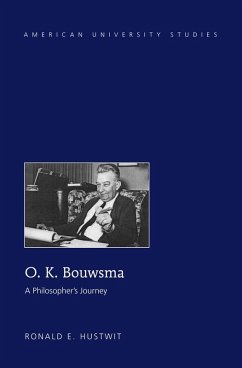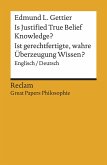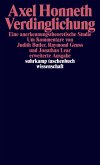O. K. Bouwsma was, with J. L. Austin and J. O. Wisdom, the best known of the «Ordinary Language» philosophers of the mid-twentieth century. In 1950, he initiated the prestigious John Locke Lectures at Oxford as a representative of that school of philosophers, who developed the implications of Wittgenstein's later philosophy. Bouwsma, a friend of Wittgenstein and oriented by the latter's work, grasped its implications for his own work. Already possessing a keen sensitivity to ordinary usages, Bouwsma developed a unique and humorous style aimed at philosophy's seemingly intractable problems. While Wittgenstein provided a method for attacking philosophical tangles, Bouwsma actually applied the method of assembling reminders of everyday language for contrast to the generalized abstractions of philosophers. Passing beyond an attraction to G. E. Moore's common sense refutations of philosophical skepticism, Bouwsma developed analytic techniques based on the realization that the test of sense in philosophical theorizing lay in the grammar of established usage of language.
An avid reader of Kierkegaard, Bouwsma found in him a clue to understanding the language of religious belief. That language is to be understood in the lives of people who actually practice faith rather than in metaphysical or epistemological systems meant to explain faith's rationality. To that end, Bouwsma wrote essays on religious themes. In addition to such essays, he also wrote on aesthetics aimed at understanding philosophical language about poetry and music. Directed to any of these areas, his essays are among the finest writings in the British-American philosophical tradition. They flow without technical language, are pointedly humorous, and make delightful reading.
An avid reader of Kierkegaard, Bouwsma found in him a clue to understanding the language of religious belief. That language is to be understood in the lives of people who actually practice faith rather than in metaphysical or epistemological systems meant to explain faith's rationality. To that end, Bouwsma wrote essays on religious themes. In addition to such essays, he also wrote on aesthetics aimed at understanding philosophical language about poetry and music. Directed to any of these areas, his essays are among the finest writings in the British-American philosophical tradition. They flow without technical language, are pointedly humorous, and make delightful reading.
Dieser Download kann aus rechtlichen Gründen nur mit Rechnungsadresse in A, B, BG, CY, CZ, D, DK, EW, E, FIN, F, GR, HR, H, IRL, I, LT, L, LR, M, NL, PL, P, R, S, SLO, SK ausgeliefert werden.



